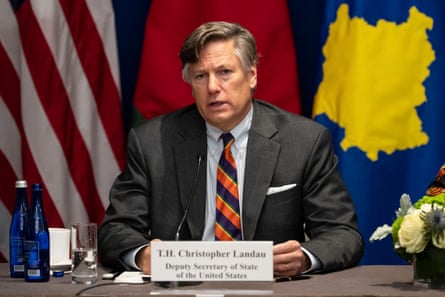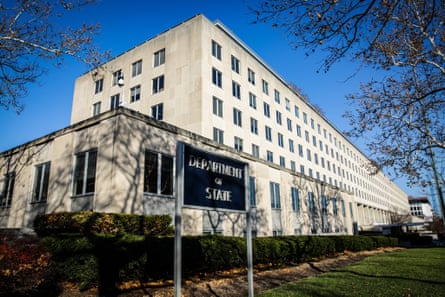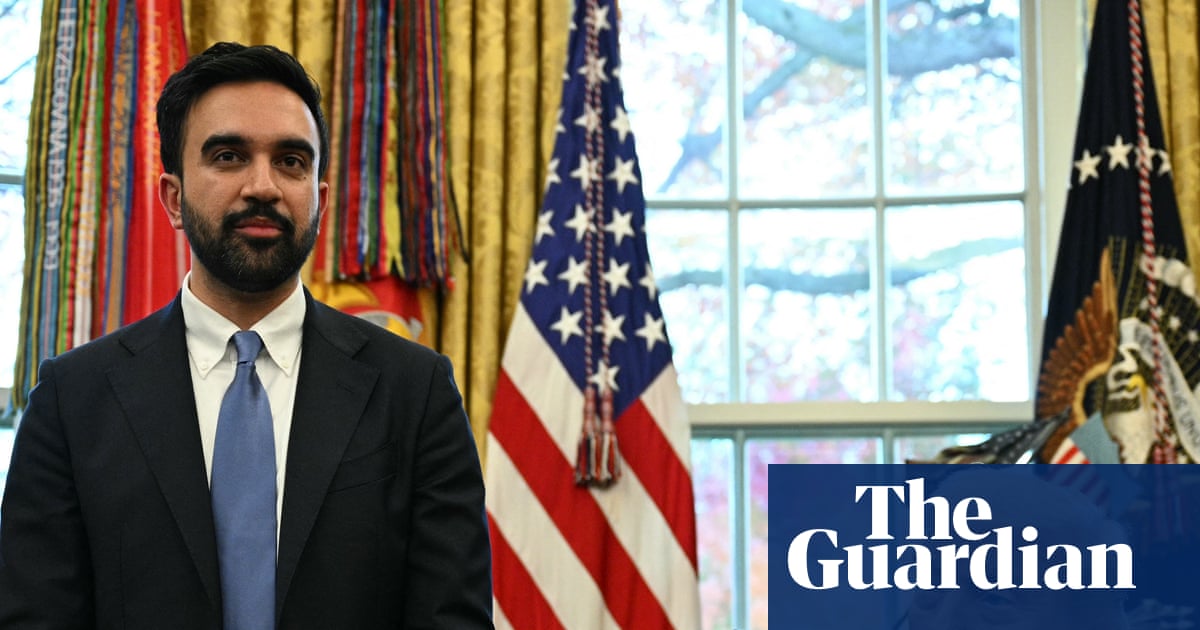The historic shifts in US immigration under Donald Trump have been dictated by a relentless voice over a telephone line: Stephen Miller, the president’s immigration czar, who in recent months has turned the state department’s visa and refugee operations into what some current and former diplomats have described as a personal fiefdom.
Each morning, usually at 10am, a small circle of conservative diplomats allied with Miller, including those who have assumed control of the state department’s consular and refugee operations, dial in for what some have termed the “Stephen Miller call”, an interagency discussion of immigration measures led by Miller, the White House’s homeland security adviser.
In the calls, Miller is said to drill the diplomats on visa and immigration issues – pressing officials to hasten negotiations with third countries to accept deportees who can not or should not be sent back to their countries of origin, and lobbying for individual visa revocations for critics of Israel’s war in Gaza or of Charlie Kirk, the conservative pundit who was assassinated in September.
Miller’s influence, said one former senior official briefed on the calls, was part of a broader strategy under the Trump administration of “installing trusted people in the key positions, and turning [the state department] into an anti-immigration machine”.
In the months since Trump was inaugurated, the US has revoked thousands of visas, many for students, established full or partial bans on immigrants from 19 countries, announced it would take only 7,500 refugees next year and give priority to white South Africans and deported tens of thousands of people sometimes to third countries in harsh conditions. At the state department, diplomats said that the administration’s focus on immigration was a significant pivot, especially for those who had previously worked in departments seeking to facilitate legal migration rather than deter it.
“It is certainly true in the Trump administration that migration issues have become a key pillar of our foreign policy, and this may be here to stay for the rest of the century,” said a current senior state department official speaking on background. “Frankly … this is something that is somewhat new for the state department. I would say migration issues have not typically been considered to be a key focus of the United States diplomatic role in the world.”
The calls have reached the highest levels of the state department – a regular attender is deputy secretary of state Christopher Landau, an ally of Miller’s and a vocal advocate in the Trump administration’s state department of tighter immigration. He has taken up his role of immigration hawk with relish, recently calling on followers on Twitter to single out targets to revoke visas under the tagline “El Quitavisas”, or “The Visa Taker”.

Others are members of a new conservative community of diplomats called the Ben Franklin Fellowship, which has condemned the pro-diversity, equity and inclusion (DEI) policies of previous state departments, as well as senior officials from the Bureau of Population, Refugees and Migration, which has been restructured to include an “Office of Remigration” under the new administration.
Miller’s oversight of a conservative band of diplomats on immigration issues whom he regularly peppers with requests for information and status updates buffets his reputation as the most powerful official in Trump’s government, with a vast portfolio that also includes the recent strikes on Venezuelan drug boats, multiple administration officials have told the Guardian. Critics such as Kamala Harris have called him a white supremacist, while the Southern Poverty Law Center called his immigration policies “racist and draconian”.
His influence also illustrates how the White House has sought to overcome a “deep state” of professional diplomats, elevating allies into key roles and then deploying Miller to oversee them with sometimes obsessive attention to detail.
A White House official said the calls were not unusual and that one former diplomat’s assertion that Miller treated immigration operations as a “personal fiefdom” were “just inaccurate”.
“Stephen Miller is a staffer in the Trump administration who is just like any other staffer working to implement the President’s agenda, and any claims that this is Stephen’s policy are inaccurate and demonstrate a lack of understanding about the role of the Homeland Security Advisor,” said the official, who requested anonymity to discuss administration’s staffing roles and internal communications.
“President Trump promised to combat the failed open border policies of the previous administration,” said Tommy Pigott, principal spokesperson for the state department. “The entire Administration is working seamlessly together to implement the President’s agenda that he was elected to enact. Thanks to the President’s leadership we now have the most secure border in HISTORY, and the Administration will continue closely coordinating on key Administration priorities. Individuals complaining about White House-agency coordination fundamentally misunderstand our system of government.”
Earlier this year, John Armstrong, the senior bureau official for consular affairs, testified in court that Miller had personally held “at least a dozen” conversations with him to discuss revoking visas for pro-Palestinian academics, often identified by the website Canary Mission, with suspected ties to Israel.
In the lawsuit against the Trump administration’s efforts to deport noncitizens for protesting against the war in Gaza, Armstrong asserted privilege to withhold information that “may concern controversial approaches to the government’s foreign affairs priorities”, saying it could “chill an exchange of information between federal agencies”. In his ruling against the Trump administration, a judge disclosed that attenders included Miller and Andrew Veprek, a veteran diplomat close to Miller who now serves as the deputy assistant secretary for the Bureau of Population, Refugees and Migration.
The Guardian has learned that similar calls take place most days and that Miller is dictating detailed policy advice to diplomats at a time when the process of receiving a visa to the United States has become demonstrably more arduous around the world; wait times for visa interviews are ballooning, applicants for non-immigrant visas are required to appear for interviews in their home countries, and the administration is scouring foreign applicants’ social media posts for pretexts to deny entry to the United States.
One current state department official briefed on the Miller calls noted that they were held in strict secrecy with no public briefings and a small circle of conservative allies of Miller, who has led the administration’s efforts to elevate immigration as a main priority for law enforcement and US diplomats.
“This is basically happening every single day, but without those safeguards to understand what’s actually happening,” said the official. “As questions are asked by the White House, or proclamations are made … that gets distilled down into a policy guidance or direction to do it now, do it hard … There’s no room for discussion.”
The person said that the calls were “very weedy [looking at granular detail]; they’re asking about not just specific policies or visa categories or removal efforts or things like that, but country-by-country specifics”, the person said. The calls can last for up to an hour.
after newsletter promotion
Miller would regularly telephone mid-level diplomats during Trump’s first term to demand status reports on their efforts to deport immigrants, former diplomats said, but the regular attendance of a deputy secretary of state on the call was “very unusual”.
“[Landau] sits in those meetings … and then becomes the hammer to ensure that whatever Miller decides to gets done,” that person said of the current deputy secretary of state.

Inside the Bureau of Consular Affairs (CA), which administrates US visa issuance, the administration has replaced leadership to ensure that its plans are not thwarted by a supposed liberal “deep state” of career diplomats. Unlike with most other departments during the transition, the White House immediately removed the deputy assistant secretaries and quickly replaced them with ideological allies, in effect replacing control of the department on the morning of 21 January 2025.
Most of the senior members of CA who now manage visa policy are members of the Ben Franklin Fellowship (BFF), a kind of Federalist Society for diplomats that has served as an unofficial recruitment pool under the new administration.
Two of the organisation’s three co-founders are former consular officers and immigration hawks, and one of the group’s founding pillars is a call to secure American borders.
In interviews, several co-founders of that group rejected the characterization of the current administration’s policies as “anti-immigration”, saying instead that they were a corrective to a dangerous policy of open borders promoted under Joe Biden and previous administrations.
“Each action has an equal and opposite reaction; when you have a wild swing to one direction, you’re going to have a wild swing to try to clean it up,” said Simon Hankinson, a senior research fellow in the border security and immigration center at the Heritage Foundation and a co-founder of the group, in an interview. “Even though I’ve seen other changes in incoming administrations that were slower and perhaps more subtle and more in the weeds, you know, [there were] things that experts would notice, like Daca [Deferred Action for Childhood Arrivals], for instance, or temporary protected status.”
Hankinson said it was a “fluke” that BFF’s members had been appointed to CA, although another co-founder noted that the administration had considered personnel in various agencies before the transition and the BFFs were a natural source for recruitment at the state department.
“There was an attempt to figure out who might be actually not part of the resistance, who actually endorsed or supported administration policy,” said Matt Boyse, a senior fellow with Hudson Institute’s center on Europe and Eurasia and a co-founder of BFF. “That was actually, I think, a good attempt by them to ensure that the people who were in senior positions or overseeing policy were in line with the administration.”
“This is not politicizing the foreign service,” continued Boyse, a former career diplomat, when asked whether it was. “We fundamentally reject that idea. Just like in any foreign service, there are people of varying political orientations. There are so in the United States, and that charge is slanderous. It misunderstands the whole mission.”
The quick promotion of ideologically allied diplomats has angered many in the state department who had survived layoffs that cut hundreds of positions. During a recent town hall, according to a person on the call, one angry diplomat asked: “Is it required to be a Ben Franklin fellow to have any sort of leadership position in this department?”
It was one of the most upvoted questions among those listening in.
Angry staffers have said that they believe that the new leadership was promoted due to their ideological beliefs, rather than their professional accomplishments. “I mean, it’s very clear, we all see it, and that’s really disappointing,” said a current consular officer who was critical of the changing policies.

 German (DE)
German (DE)  English (US)
English (US)  Spanish (ES)
Spanish (ES)  French (FR)
French (FR)  Hindi (IN)
Hindi (IN)  Italian (IT)
Italian (IT)  Russian (RU)
Russian (RU)  3 weeks ago
3 weeks ago























Comments